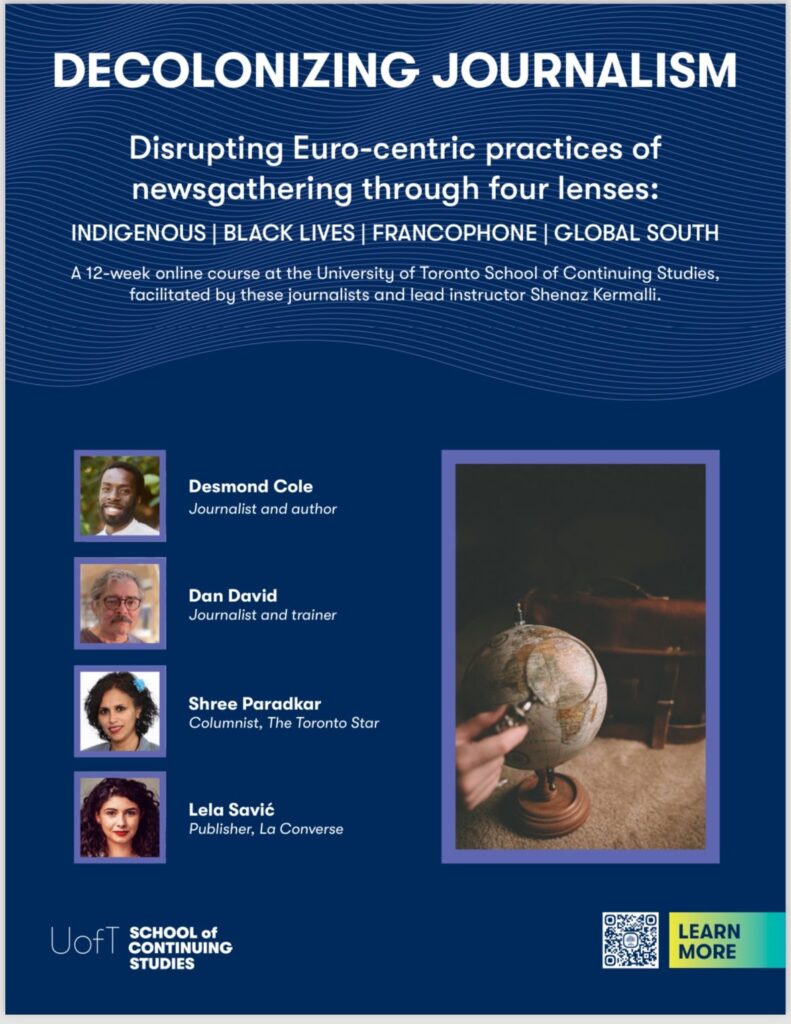The University of Toronto School of Continuing Studies is launching a new online course on decolonizing journalism, open to anyone interested in the subject matter. Over approximately 36 hours of instruction, the spring-time course will have students examine news production through the lenses of the Indigenous experience, early Black settlement, the Francophone space and the Global South.
The course was developed by journalist Shenaz Kermalli, who teaches it alongside fellow journalists Desmond Cole, Daniel David, Shree Paradkar, and Lela Savić.

In the wake of George Floyd’s murder, “the racial reckoning that newsrooms and journalism programs alike went through after that time struck a chord in me, and I felt it had become more critical than ever for journalists and the public both to really have a better understanding of how news coverage has been, and continues, to be so problematic,” says Kermalli.
Kermalli, whose reporting largely focuses on geo-political issues in the Middle East, says that unfair reporting on this region has been “hugely harmful to communities” both in Canada and in that region.
Kermalli notes the course is launching at a sensitive time. “Off the back of the media’s spectacular and well-documented failure to cover Israel’s on-going assault in Gaza fairly, it feels particularly timely to launch a course like this.” But she adds that the course was designed to address issues with coverage of domestic issues as well.
“We have communities closer to home that are often misunderstood, misrepresented, or swept under the rug,” says Kermalli. Each instructor will bring their own particular areas of expertise and experiences into the course to discuss different aspects of news coverage.
Savić, the founding editor of La Converse, a French-language non-profit digital media outlet focusing on serving marginalized communities, will lead discussions on the differences of French and English media coverage when it comes to coverage of human rights issues.
David, who is based in Kanehsatake Mohawk Territory in southern Quebec, is a former broadcast journalist and producer, magazine writer and a founding news director at the Aboriginal Peoples Television Network. His portion of the course will delve into how media relations have historically played out with Indigenous peoples across Canada.
Cole, a journalist, activist and author based in Toronto who is renowned for his work with marginalized Black communities, will lead the course content on the experiences of early Black settlers in Canada and their interactions with media.
Paradkar, racial-justice columnist and internal ombudsperson at the Toronto Star, will lead discussions on anti-racism advocacy in newsrooms and examine how the definition of news and the ways in which it is reported can change across geographical and cultural borders.
Paradkar is looking forward to interacting with students and delving into the concept of decolonizing journalism, which she notes is often misunderstood as forcing reporters to take sides in favour of one group over another. “It’s not about taking sides of one identity,” she says, “but it’s understanding what justice is.”
The materials and lectures also aim to teach participants about building trust with sources from various communities, learn about trauma-informed approaches to reporting and impart lessons on the harms of extractive journalism. Overall, Kermalli hopes that the course will help combat polarization by fostering open and rigorous debate amongst participants and instructors.
“Learners in this course can expect to come out of it with a higher degree of self-awareness, and to be challenged in their worldview,” says Kermalli.
Kermalli secured partnerships with several publications that will consider reviewing pitches from the students for potential publication. They include The Local, New Lines Magazine, The Rover, The Narwhal, Ricochet, Ku’Ku’kwes News, The Green Line, Maisonneuve, Broadview and Africa is a Country.
Instructors will guide students through the process of coming up with story ideas and writing story pitches, and connect them with editors for consideration. “We see this arrangement as being mutually beneficial, because it would enable us to give learners, who are often freelancers and subject matter experts, access to industry. It also gives news outlets access to fresh talent with hopefully some fresh perspectives,” says Kermalli.
Decolonizing journalism runs during the spring-summer term online for a cost of $799, with another session running in fall 2024. Registration remains open and no previous experience in journalism is required.
Iman Adem, a journalism graduate from Toronto Metropolitan University, is a writer with a passion for stories from the Global South. She’s contributed to publications like the Review of Journalism, Eyeopener, and Literary Review of Canada, bringing diverse perspectives to light.
